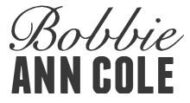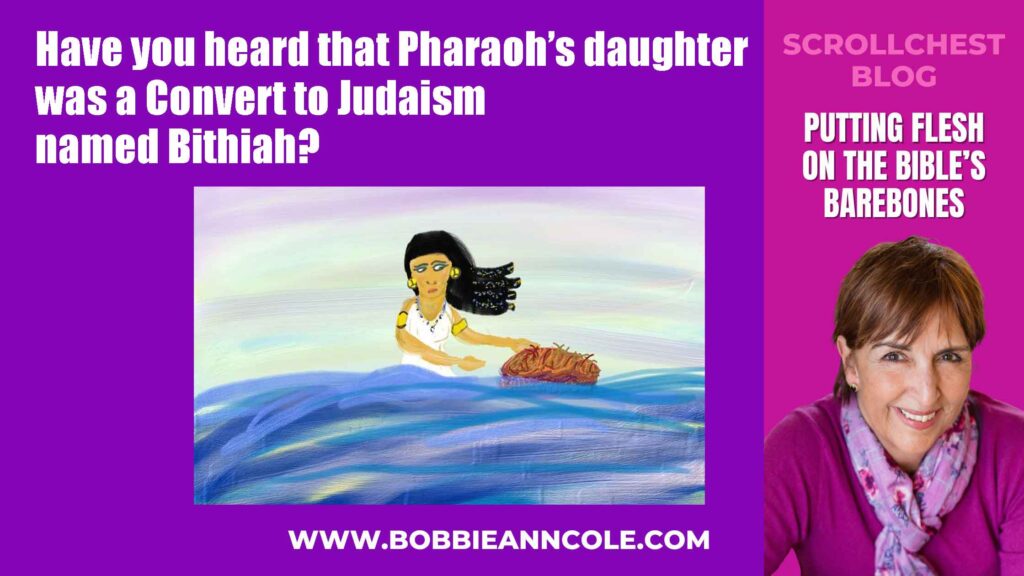Bithiah, the adoptive mother of Moses, is a well-respected ‘mother’ in Hebrew thought, although very little indeed is known about her. We are not even sure that she was Bithiah, though late Second Temple and rabbinic writers were certain of it.

Who was Bithiah, also known as Batya, which means ‘Daughter of God’?
Most of what we know about her comes from Exodus 2, the story often referred to as Moses in the Bullrushes.
Pharaoh was killing the newborn Hebrew sons. Jochebed, Moses’ mother, had hidden him from the Egyptians for three months since his birth. Desperate for his safety, she made a tevah for him, a papyrus basket, coated with tar and pitch.*
“Then she placed the child in it and put it among the reeds along the bank of the Nile. His sister stood at a distance to see what would happen to him.
Then Pharaoh’s daughter went down to the Nile to bathe, and her attendants were walking along the riverbank. She saw the basket among the reeds and sent her female slave to get it. She opened it and saw the baby. He was crying, and she felt sorry for him. “This is one of the Hebrew babies,” she said.
Then his sister asked Pharaoh’s daughter, “Shall I go and get one of the Hebrew women to nurse the baby for you?”
“Yes, go,” she answered. So the girl went and got the baby’s mother. Pharaoh’s daughter said to her, “Take this baby and nurse him for me, and I will pay you.” So the woman took the baby and nursed him. When the child grew older, she took him to Pharaoh’s daughter and he became her son. She named him Moses, saying, “I drew him out of the water.”
Exodus 2:3-10

Pharaoh’s daughter was a brave woman indeed to take in one of the Hebrew children her father was having killed, especially as everything that happened would have been seen by her maids, guards and litter bearers.
Why was she going down to the Nile to bathe?
According to The Ancient Mythology of the Nile,, “Ancient Egyptians considered the Nile to be a gift of the gods and they equated the Nile with life itself.”
Bithiah may have been going to bathe in the Nile as a gesture of devotion to Egyptian gods.
However, Jewish sages suggest that she had made the choice already to follow the God of Israel and was intending to immerse herself as a gesture of purification, as if in a mikvah immersion bath.
We shall never know.
An Arrangement
Rabbi Jonathon Sacks suggests that the dialogue Bithiah engaged in with Moses’ sister, Miriam, who offered to find a ‘wet nurse’ for the baby, was all role play and a means of Jochebed keeping her son without it looking as if he were one of the Hebrew children:
‘“You know and I know,” Moses’ sister implies, “who this child is; it is my baby brother.” She proposes a plan brilliant in its simplicity. If the real mother is able to keep the child in her home to nurse him, we both minimize the danger. You will not have to explain to the court how this child has suddenly appeared.’
Rabbi Jonathon Sacks
Bithiah’s brave decision to raise Moses would ultimately lead to the release of the Israelite slaves. Without her, Moses could not have grown up to lead his people out of slavery into freedom in a land of their own— the very opposite of her father’s intent.
Pharaoh’s daughter names Moses
Children in Torah are named by their parents or, in some exceptional cases, by God, (e.g. Isaac, Jacob who is renamed Israel, Abram and Sarai who become Abraham and Sarah).

Bithiah, however, names Moses, as if she were his natural mother. Rabbi Sacks, who raises this point, renders the verse generally translated as, “I drew him out of the water,”
“I bore him out of the water.”
Exodus 2:10
It is almost as if we are told that she gave birth to Moses when she drew him out of the Nile.
Why did she adopt Moses?
Any suggestion of a reason behind Bithiah’s actions is going to be pure speculation. What can be said is that she had a gentle heart, filled with compassion. And she was dogged in her follow through, not just supporting Moses infancy but going on to raise him as her own son.
When the Sages attributed each verse of Proverbs 31 that describes A Woman of Valor to different Jewish heroines, they linked, “She rises while it is still night,” to Bithiah, which seems a fitting verse for a woman who takes action in times of darkness. as she did.
Who gave Moses his deep faith?
Did Jochebed, a woman from the priestly tribe of Levi, have time to instill this in him before handing him over to Pharaoh’s daughter?
Was she able, through her own strong faith, to bring Bithiah to reject her Egyptian gods and believe in God?
For it seems Bithiah may have converted and become a mother in the tribe of Judah.
In 1 Chronicles 4, which lists the descendants of Judah, the tribe from which Jesus was descended, it would appear Bithia married a man named Mered,
“His Judahite wife gave birth to Jered the father of Gedor, Heber the father of Soko, and Jekuthiel the father of Zanoah. These are the children of Pharaoh’s daughter Bithiah, whom Mered had married.”
1 Chron. 4:18

If this is the same Bithia, then she must have left Egypt with the Hebrew slaves and traveled with them to the Promised Land.
What a decision! What a journey to undertake, leaving her people behind, for the sake of her adopted son, Moses. If true, the implication is of an unbreakable bond between them.
What was her relationship with Moses’ mother Jochebed?
My friend Alison Hayes who writes about Jochebed suggests a ‘soul connection’ between Jocheved and Bithiah, brought about through hearing Jochebed’s singing to the infant Moses.
She believes that, “the differences in culture, heritage and religion between the two women would have dissipated. Bithiah could have come to faith through Jochebed’s singing…Then, later, through storytelling. Jochebed would have been teaching both child and adoptive mother simultaneously.”
Alison Hayes
The outcome of her faith was a big choice and a big commitment
Whether Bithiah is Moses’ mother or not, the integration into Jewish society of a Pharaoh’s daughter Bithiah, wife of Mered, in 1 Chronicles 4, foreshadows Jews and Gentiles together, living in harmony, in accordance with the Apostle Paul’s vision of the Christian faith:
‘As Scripture says, “Anyone who believes in him will never be put to shame.”For there is no difference between Jew and Gentile—the same Lord is Lord of all and richly blesses all who call on him, for, “Everyone who calls on the name of the Lord will be saved.
Romans 10:11-13
It is the same with Tamar, Rahab and Ruth, all of whom were outsiders who ‘married in’ and bore Jewish children.
The Jewish nation is grateful. The Sages imagine God telling Bithiah,
“The Holy One, blessed be He, said to her: ‘Moses was not your son, yet you called him your son. You are not My daughter, but I shall call you My daughter.’”
Vayikra Rabbah 1:3
*Tevah is also the word that is used to refer to Noah’s ark.

Please sign up in the sidebar to be the first to hear about my posts. By way of a Thank You, you will receive my 5-Minute Testimony: How I Met Jesus. I was a bit reluctant at first: I expected my Jewish family to turn against me.


Great!
Thanks.
I’m glad you enjoyed this, Steve.
Thanks, Bobbie
As you’ve said, we shall never know!
Fragments of this story are in the Bible. Reading the Old Testament is vitally integral with the New Testament. God reveals its mysteries to those open hearted enough to believe, even when we don’t fully know and understand. The living Word brings it all alive and connects us with God’s people, even as far back as Jochabed, Moses and Bithiah. It blows me away! Alison Hayes
It seems to me so very special that Pharaoh’s daughter should be part of that massive trek to freedom. I hope that the link between Exodus and 1 Chron. 4 is the same woman, because of all the implications – that the woman who raised Moses came to faith in God.
I had heard of Bithia! Have you read Pharaoh’s Daughter by Mesu Andrews
I wasn’t aware of this book, Naomi. I looked it up: https://www.amazon.com/The-Pharaohs-Daughter-CA-audiobook/dp/B012BHZ9D2/
You make me think, Bobbie. Thanks. Though I’m inclined to believe that Bithia, wife of Mered, and Moses’s adoptive mom have to have been two separate women. Moses was 80 years old at the Exodus. It seems impossible to me that his mom could have still been living. Yet, as you point out, she deserves praise. Whether she left the ruined land of Egypt in the Exodus or not, she was brave, gentle, and generous. What a story! An Egyptian princess adopted him, the frightened and crying infant, Moses.
I hope she did come to faith in the living God, the God of Abraham, Isaac, and Jacob.
You make a valid point about the unlikelihood of Pharaoh’s daughter being still alive when the Exodus happened, Dana. Nevertheless, it is such a beautiful story that I would like it to be true.
Thought provoking, Bobbie! I’ve always found the Biblical story about Moses to be intriguing. To me, this story was orchestrated by God, especially since Moses was saved from death by the hands of the soldiers, who were on orders to kill the infant boys.
God’s story is filled with women from other cultures who come over to the faith, Faith. Three of them are mentioned in Matthew’s genealogy. A fourth was the wife of Uriah, a Hittite. The input and actions of foreigners is vital.